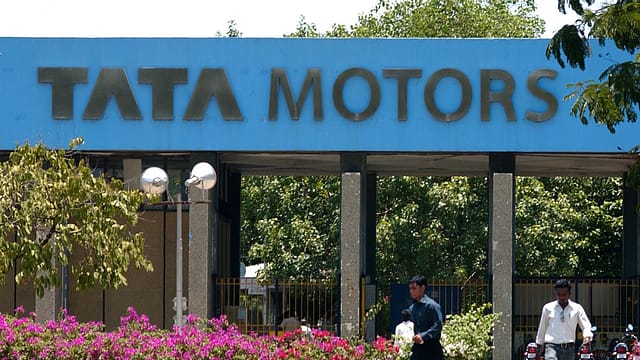Tata Motors shares hit record high
ADVERTISEMENT

Shares of Tata Motors hit a record high on Thursday after its engineering services unit Tata Technologies announced the price band of its initial Public Offering (IPO) at ₹475-500 per share. The Tata group stock has gained 5% this week after credit rating agencies Moody's and S&P Global upgraded the automaker's ratings.
The auto stock opened at ₹674 against its previous closing price of ₹671.55 apiece on the National Stock Exchange (NSE). The scrip hit an all-time high of ₹685.50, up 1.5% in intraday trade today. Tata Motors' market capitalisation rose to ₹2.26 lakh crore. The stock has given a return of 73% this year.
Tata Motors owns a 74.69% stake in Tata Technologies. At the upper price band, the Tata Motors subsidiary will fetch around ₹3,042.5 crore, and its valuation will stand at ₹20,283 crore. Tata Technologies IPO will be launched on November 22, 2023, and will close on November 24, 2023. The automaker will use the funds to pay off its debt as it looks to make its India business net cash positive by the end of the ongoing fiscal. Net automotive debt of Tata Motors' India business stood at ₹7,600 at the end of the September quarter.
Earlier this week, S&P Global Ratings (S&P) upgraded the credit ratings of Tata Motors to BB+ from BB. Tata Motors' debt reduction will likely accelerate over the next 12-18 months, driven primarily by strong free operating cash flow at JLR, the rating agency said.
Moody's Investors Service last week upgraded Tata Motors ratings to Ba3 from B1 and maintained a positive outlook on all ratings. Moody's also raised Jaguar Land Rover Automotive Plc's (JLR) corporate family rating (CFR) to Ba3 from B1.
The rating upgrades and positive outlook are underpinned by Tata Motors' conservative financial policies that balance growth with prudent debt management, which will support a further improvement in its credit profile over the next 12- 18 months, says Kaustubh Chaubal, a Moody's senior vice president and lead analyst for Tata Motors.
Tata Motors remains focused on achieving its net zero automotive debt target by March 2025. Moody's estimates that the automaker will reduce its gross debt by almost 30% by March 2024 from March 2022 levels. Strong underlying demand has boosted volumes, the rating agency says. At the same time, the company has constantly refreshed its product slate with a wide offering across price points and sustained cost rationalisation initiatives, it adds.
Moody's forecasts for JLR assume a 25% increase in its wholesale volumes to at least 400,000 in FY24, twice its order book of around 200,000 units as of March 2023. JLR's revenues will likely climb to nearly 30 billion pounds during FY24, it says.
JLR's strategy of transitioning to an all-electric portfolio of Jaguar and Land Rover nameplates by the end of the decade will require large expenditure towards engineering, product development and new platforms. Still, Moody's expects the premium car maker to generate annual free cash flow exceeding 2 billion pounds during fiscal 2024 and for it to remain substantially positive beyond, after staying negative for five of the previous eight fiscal years.
Tata Motors reported a consolidated net profit of ₹3,764 crore for the quarter ended September compared with a loss of ₹945 crore in the year-ago period. Revenue from operations jumped 32% year-on-year to ₹1.05 lakh core in the second quarter as against ₹79,611 crore in the corresponding quarter last year.